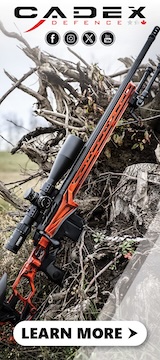So I put some loctite to help hold a clamp on the magazine tube of a lever action rifle. The loctite is good to 150 degrees Celsius or 300 degrees F. Would the magazine tube ever get hot enough that the loctite will fail? The loctite is in direct contact with the tube. The round is 30-30. Thanks!
You are using an out of date browser. It may not display this or other websites correctly.
You should upgrade or use an alternative browser.
You should upgrade or use an alternative browser.
Magazine tube reach 150 degrees Celsius?
- Thread starter quorum
- Start date
In "Gunshot Wounds" by Vincent Di Maio, 22 long rifle cartridges detonate at an average of 275F, .38 Special at 290F and 12 gauge shotgun shells at 387F.
edit :
Gunshot Wounds
Practical Aspects
of Firearms, Ballistics,
and Forensic Techniques
Second Edition
by
Vincent J. M. DiMaio, M.D.
Experiments have been conducted to determine at what temperature a
small-arms cartridge will detonate.Cartridges were placed in an oven and
the furnace was heated until the round exploded. It was found that .22 Long
Rifle cartridges exploded at an average of 275°F, .38 Special rounds at 290°F,
.30–06 at 317°F, and 12-gauge shotgun shells at 387°F. Whereas the cartridges
detonated in every case, the primers did not. In some of the detonated rounds,
the primers were removed, loaded into other cartridges cases, and fired.
ht tp://www.sciencedirect.com/science/article/pii/S2214914714000385
The experimental investigations of the effect of contact time/temperature on initiating the cook-off using 7.62 mm calibre cartridge cases (CC) were conducted previously. These cartridges were filled with commercial off-the-shelf (COTS) double based (DB) propellant (Bulls Eye) and were loaded in a hot chamber. The thermal explosion temperature is of great significance to both weapon designers and safety inspectors as it provides the operational limit and safe operating temperature. For CC under test, it was found that the cook-off temperatures of this propellant were encountered with the heat transfer profile of the simulated gun barrel between 151.4 °C and 153.4 °C, with a reaction occurring in less than 300 s after the round was chambered. Usefully, each experiment was found to be consistent and repeatable.
edit :
Gunshot Wounds
Practical Aspects
of Firearms, Ballistics,
and Forensic Techniques
Second Edition
by
Vincent J. M. DiMaio, M.D.
Experiments have been conducted to determine at what temperature a
small-arms cartridge will detonate.Cartridges were placed in an oven and
the furnace was heated until the round exploded. It was found that .22 Long
Rifle cartridges exploded at an average of 275°F, .38 Special rounds at 290°F,
.30–06 at 317°F, and 12-gauge shotgun shells at 387°F. Whereas the cartridges
detonated in every case, the primers did not. In some of the detonated rounds,
the primers were removed, loaded into other cartridges cases, and fired.
ht tp://www.sciencedirect.com/science/article/pii/S2214914714000385
The experimental investigations of the effect of contact time/temperature on initiating the cook-off using 7.62 mm calibre cartridge cases (CC) were conducted previously. These cartridges were filled with commercial off-the-shelf (COTS) double based (DB) propellant (Bulls Eye) and were loaded in a hot chamber. The thermal explosion temperature is of great significance to both weapon designers and safety inspectors as it provides the operational limit and safe operating temperature. For CC under test, it was found that the cook-off temperatures of this propellant were encountered with the heat transfer profile of the simulated gun barrel between 151.4 °C and 153.4 °C, with a reaction occurring in less than 300 s after the round was chambered. Usefully, each experiment was found to be consistent and repeatable.
Last edited:




































































